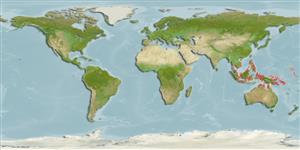Klassifizierung / Names
Namen | Synonyme | Catalog of Fishes(Gattung, Arten) | ITIS | CoL | WoRMS | Cloffa
Environment: milieu / climate zone / depth range / distribution range
Ökologie
seewasser demersal; tiefenbereich 1 - 5 m (Ref. 90102). Tropical
Western Pacific: South China Sea.
Size / Gewicht / Alter
Maturity: Lm ? range ? - ? cm
Max length : 12.0 cm TL Männchen/unbestimmt; (Ref. 90102)
Kurzbeschreibung
Morphologie | Morphometrie
Rückenflossenstacheln (insgesamt): 6 - 7; Rückenflossenweichstrahlen (insgesamt): 10; Afterflossenstacheln 1; Afterflossenweichstrahlen: 10. Characterized by greyish body color with dark brown bar below eye; gill cover with vertically elongate brown patch, dark brown spot just above; four large, rectangular blackish spots along middle of side to base of caudal fin; irregular brown spotting on back; spot near margin of first dorsal fin, large pale-edged black spot; united pelvic fins, frenum present; longitudinal scale series 77-97; posterior body with ctenoid scales, becoming cycloid anteriorly; head without scales; greatest depth of body5.1-6.1 in SL; lanceolate caudal fin, a little longer that head length; presence of oculoscapular sensory canal and pores (Ref. 90102).
Inhabits silty near shore reefs, often stream mouths in 1-5 m (Ref 90102).
Life cycle and mating behavior
Geschlechtsreife | Fortpflanzung | Ablaichen | Eier | Fecundity | Larven
Randall, J.E. and K.K.P. Lim (eds.), 2000. A checklist of the fishes of the South China Sea. Raffles Bull. Zool. Suppl. (8):569-667. (Ref. 36648)
IUCN Rote Liste Status (Ref. 130435)
Bedrohung für Menschen
Harmless
Nutzung durch Menschen
Mehr Information
NamenSynonymeMetabolismusRäuberÖkotoxikologieFortpflanzungGeschlechtsreifeAblaichenSpawning aggregationFecundityEierEientwicklung
Alter/GrößeWachstumLänge-GewichtLänge-LängeLängenhäufigkeitenMorphometrieMorphologieLarvenLarven Pop.Dyn.RekrutierungDichteBRUVS
ReferenzenAquakulturAquakultur ProfilZuchtlinienGenetikElectrophoresesVererbbarkeitKrankheitenVerarbeitungNutrientsMass conversion
PartnerBilderStamps, Coins Misc.LauteCiguateraGeschwindigkeitSchwimmstilKiemenoberflächeOtolithsGehirngrößeSehfähigkeit
Tools
Zusatzinformationen
Download XML
Internet Quellen
Estimates based on models
Preferred temperature (Ref.
123201): 28.2 - 29.2, mean 28.8 °C (based on 916 cells).
Phylogenetic diversity index (Ref.
82804): PD
50 = 0.5000 [Uniqueness, from 0.5 = low to 2.0 = high].
Bayesian length-weight: a=0.00708 (0.00333 - 0.01504), b=3.09 (2.92 - 3.26), in cm total length, based on LWR estimates for this (Sub)family-body shape (Ref.
93245).
Trophic level (Ref.
69278): 3.4 ±0.4 se; based on size and trophs of closest relatives
Widerstandsfähigkeit (Ref.
120179): hoch, Verdopplung der Population dauert weniger als 15 Monate. (Preliminary K or Fecundity.).
Fishing Vulnerability (Ref.
59153): Low vulnerability (10 of 100).
